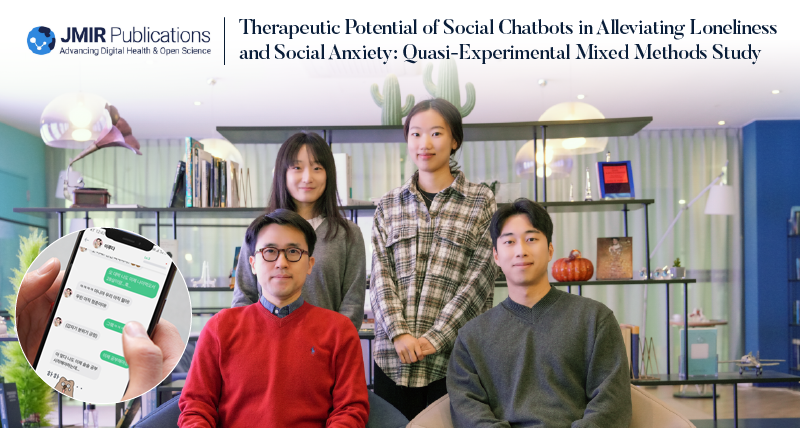A recent study has found that social chatbots, an interactive form of artificial intelligence (AI), are effective in alleviating feelings of loneliness and social anxiety in university students.
Professor Dooyoung Jung and his team in the Graduate School of Health Science and Technology at UNIST, in collaboration with Professor Chul-Hyun Cho from the Department of Psychiatry at the Korea University Anam Hospital, released the findings of their joint research on the impact of social chatbots and conversations on mental health, which has important implications for mental health treatment.
The study utilized the well-known social chatbot ‘Iruda 2.0.’ The research team recruited 176 participants who engaged with the chatbot more than three times a week over a four-week period. Participants’ levels of loneliness and social anxiety were assessed using standardized survey instruments.
Data collected before and after the intervention were compared and analyzed. Additionally, small-scale interviews were conducted to gain an in-depth understanding of participants’ experiences. The research aimed to evaluate how interactions with the chatbot contributed to enhancing individuals’ emotional stability and social connections.
Results indicated that regular interactions with social chatbots reduced loneliness scores by an average of 15% and alleviated social anxiety scores by an average of 18%. The chatbot’s effectiveness in mitigating loneliness was further enhanced when users provided detailed information about their feelings, thoughts, and experiences, or when users exhibited higher resilience. The findings also suggest that chatbots may offer greater emotional management benefits to individuals who struggle with face-to-face interactions.
“We have confirmed that social chatbots can serve as effective digital tools for alleviating loneliness and anxiety,” stated Myungsung Kim, the first author of the study and a Ph.D. student at the UNIST Graduate School of Health Science and Technology. “This study is significant as it empirically demonstrates that chatbots can deliver emotional support beyond mere technical devices, and that factors related to interpersonal relationships influence these effects.”
Professor Jung, who is also a psychiatrist, remarked, “If utilized safely, social chatbots can be valuable for the prevention of mental health issues, particularly in environments where professional resources are limited.”
The research team is planning further studies to enhance the usability of chatbots and strengthen personalized services in the future, while also exploring the potential limitations and biases of using social chatbots as a mental health intervention.
These findings were published online on January 14 in the Journal of Medical Internet Research, a leading international academic journal in advanced digital healthcare.
Journal Reference
Myungsung Kim, Seonmi Lee, Sieun Kim, et al., “Therapeutic Potential of Social Chatbots in Alleviating Loneliness and Social Anxiety: Quasi-Experimental Mixed Methods Study,” JMIR., (2025).












